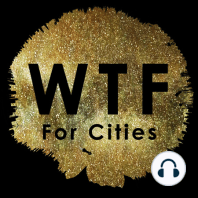9 min listen

041R_A 100 smart cities, a 100 utopias (research summary)
041R_A 100 smart cities, a 100 utopias (research summary)
ratings:
Length:
10 minutes
Released:
Mar 21, 2022
Format:
Podcast episode
Description
Summary of the article titled A 100 smart cities, a 100 utopias from 2015 by Ayona Datta published in the Dialogues in Human Geography journal.
Since we are investigating the future of cities, I thought it would be interesting to see the smart city application in India as it becomes the site of producing 100 proposed smart cities. This article investigates the technocratic nationalism, and the presence of young urban population influencing the smart city dream.
The article is available through this link.
Abstract: In my response to the commentaries on my anchor article, I have taken on board the key question of how and why India has become the site of production of 100 proposed smart cities. I forward a notion of ‘technocratic nationalism’ to suggest that it is the young urban population in India who have largely bought into the smart city dream. Whilst drawing encouragement from the largely positive commentaries on my article, I then take on three main critiques of the article – first, that it has inadvertently promoted a hegemony of ‘city-ness’ by focusing on the imagined smart city to be; second, that the smart city has strong connections with colonial urban planning and third, whether Dholera should be considered the first smart city at all. I suggest that the article’s city-ness and postcolonial links to India’s urban planning is both political and heuristic, since it is the postcolonial ‘urban’ moment where India has situated its moment of modernity globalization and economic power. I contend that the final critique is based on a misinterpretation of the use of the word ‘first’, which was always intended to reflect a politics of innovation among cities. Finally, I suggest that the other ‘gaps’ in my article highlighted by one of the commentators is not a gap, rather beyond the scope and objectives of an exploratory article such as this.
The transcript is available through this link.
What wast the most interesting part for you? What questions did arise for you? Let me know on twitter @WTF4Cities!
I hope this was an interesting episode for you and thanks for tuning in.
Music by Lesfm from Pixabay
Since we are investigating the future of cities, I thought it would be interesting to see the smart city application in India as it becomes the site of producing 100 proposed smart cities. This article investigates the technocratic nationalism, and the presence of young urban population influencing the smart city dream.
The article is available through this link.
Abstract: In my response to the commentaries on my anchor article, I have taken on board the key question of how and why India has become the site of production of 100 proposed smart cities. I forward a notion of ‘technocratic nationalism’ to suggest that it is the young urban population in India who have largely bought into the smart city dream. Whilst drawing encouragement from the largely positive commentaries on my article, I then take on three main critiques of the article – first, that it has inadvertently promoted a hegemony of ‘city-ness’ by focusing on the imagined smart city to be; second, that the smart city has strong connections with colonial urban planning and third, whether Dholera should be considered the first smart city at all. I suggest that the article’s city-ness and postcolonial links to India’s urban planning is both political and heuristic, since it is the postcolonial ‘urban’ moment where India has situated its moment of modernity globalization and economic power. I contend that the final critique is based on a misinterpretation of the use of the word ‘first’, which was always intended to reflect a politics of innovation among cities. Finally, I suggest that the other ‘gaps’ in my article highlighted by one of the commentators is not a gap, rather beyond the scope and objectives of an exploratory article such as this.
The transcript is available through this link.
What wast the most interesting part for you? What questions did arise for you? Let me know on twitter @WTF4Cities!
I hope this was an interesting episode for you and thanks for tuning in.
Music by Lesfm from Pixabay
Released:
Mar 21, 2022
Format:
Podcast episode
Titles in the series (100)
004R_Will the real smart city please stand up? Intelligent, progressive or entrepreneurial? (research summary) by What is The Future for Cities?